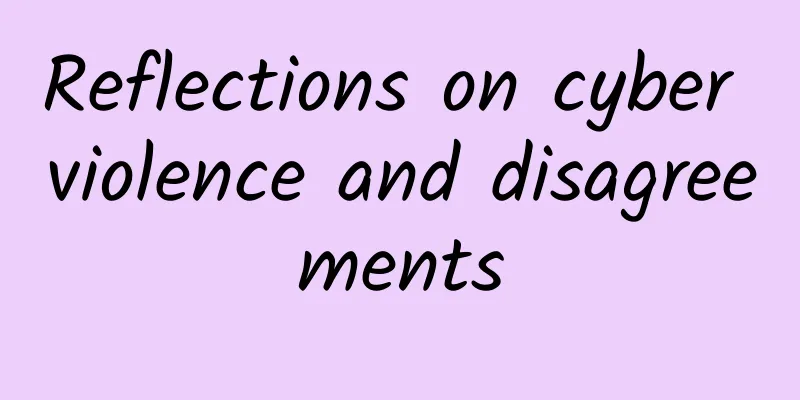Reflections on cyber violence and disagreements

|
Leviathan Press: Today's article touches on a problem that each of us will encounter: how to deal with differences. Fight or flight, we have probably all experienced it, although we all know that avoiding a certain difference does not mean that the difference will disappear. In today's Internet, this situation has become more extreme and confrontational - on the one hand, it is easier for people to find supporters of the same views online than before, and on the other hand, it is easier for two parties with opposing views to accidentally start a conflict. This is more or less "thanks to" the design attributes of the Internet: the silent majority can speak out, and therefore it is easy to coerce rationality. We still have a long way to go in terms of how to find our own position in high context and low context, and even how to rethink the issue of "face". After all, the pattern of the Internet has already been formed, and we can only adjust our thinking to actively adapt. In 2010, Time magazine named Mark Zuckerberg its Person of the Year. It described Facebook’s mission as “to tame the raging Internet mob and transform the lonely, antisocial world of random people into a friendly society.” In the first decade of widespread Internet use, there was a popular theory: when people had more opportunities to communicate with others, they would become more friendly and considerate, and eventually a peaceful and harmonious society would be formed. But in 2021, that vision seems naive. Online trolls wage attacks day and night, some of whom commit atrocities in the real world. The Internet connects people, but it doesn’t necessarily create friendship. At its worst, it acts as a giant machine that makes people hate each other. © Getty Images Technology has at least partly shaped our world of toxic divisions. We often feel offended by it. We talk more and listen less. Silicon Valley entrepreneur Paul Graham has observed that the internet is a divisive medium by design. Digital media platforms are inherently interactive, and humans are inherently argumentative. As Graham puts it, “Disagreement is often more stimulating than agreement.” Readers are more likely to comment on articles or posts they disagree with, and to say more (whereas there are limited ways to say “I agree”). People get more animated when they disagree, which often means getting angry. It's easy to blame Facebook and Twitter for this change, but it misses something else important: a broader, more profound change in human behavior that has been going on for decades, even centuries. In social and electronic media, communication is less one-way than ever before. Everyone is responding. If we're becoming more difficult to get along with, it's only because the modern world demands that we be vocal. The American anthropologist Edward T Hall distinguished between two modes of cultural communication, high-context and low-context. In low-context cultures, communication is explicit and direct. What people say is a direct expression of their thoughts and feelings, without the need to understand the context, or to think about who is speaking or in what context. But in high-context cultures, people rarely express themselves explicitly, and most words have "underlying" meanings. The meaning of each message depends more on the context than on the words themselves. This kind of communication is cryptic, subtle, and ambiguous. As more people move to cities, do business with strangers, and communicate on smartphones, most people in every region are living increasingly low-context lives. Different countries still have different patterns of cultural diffusion, but almost all are subject to the same forces—commerce, urbanization, and technology. They are disintegrating traditions, easing hierarchies, and bringing more conflict. Whether we are ready for this is yet to be known. For most of human history, our societies have operated in high-context mode. Our ancestors lived in settlements and tribes with shared customs and fixed governance models. But now, we often encounter people with different values and habits than our own. At the same time, we are more egalitarian than ever before. Everywhere you look, all parties have or demand an equal voice in any collaboration. Everyone wants to be heard, and it is increasingly possible. In this noisier, more pluralistic world, the previously implicit rules about what can and cannot be said have become looser and more flexible, or sometimes even disappear. With less context to guide our decisions, the number of things we “all agree on” is rapidly shrinking. Think about what defines a low-context culture, or, for that matter, what defines an extreme form of low-context: endless conversations, frequent verbal battles; everyone speaking their mind all the time! Does this remind you of anything? As conflict resolution expert Ian Macduff says, “The internet world looks a lot like a low-context world.” If humans were purely rational, we would politely listen to opposing viewpoints before offering a thoughtful response. In reality, disagreement sends chemical signals surging through our brains, making it hard to focus on the issue at hand. These signals tell us that disagreement is an attack on the self by others. “I disagree with you” becomes “I don’t like you.” Instead of opening ourselves to the other person’s point of view, we focus on our own defense. © Lynsey WeatherspoonAs early as 1915, Harvard biologist Walter Bradford Cannon discovered that animals have two basic strategies when faced with a threat: fight or flight. Humans are no exception. Disagreements can make us aggressive and lash out, or they can make us cower—keeping our opinions to ourselves in order to avoid conflict. In today’s low-context world, these primitive responses still influence our behavior: either we engage in heated, mostly pointless arguments, or we try to avoid them. Both responses are dysfunctional. You don’t have to look far to spot people disagreeing with each other: Open your social media platform or read the comments section of your favorite website. While the internet is famous for creating “echo chambers” where people only encounter opinions they already agree with, the evidence points in the opposite direction. Studies show that social media users have more diverse sources of information than non-users. You can always encounter an opinion on Twitter that you find offensive; you are much less likely to encounter such an opinion when your only source of information is a daily newspaper. The Internet is not creating bubbles, it is bursting bubbles, creating hostility, fear and anger. One reason online discourse is always full of hostility is that it is designed to be that way. Studies show that content that makes people angry is more likely to be shared. Users who post this information will get likes and reposts, and the platforms that post this information will get people's attention and engagement, which is capital for the platform's dialogue advertisers. Therefore, online platforms have an incentive to intensify every debate to the extreme. Subtle meanings, people's reflection and mutual understanding are thrown aside in the online crossfire and inevitably destroyed. But it would be a mistake to conclude that we argue too much. The empty anger we see online reveals a lack of truly thought-provoking debate: online wars are just a smokescreen for escapism. It’s often said that we must put aside our differences if we are to confront the existential threats of our time. But it’s harder to make progress when we all agree, or pretend to agree. Argument is a way of thinking, perhaps the best kind. It’s essential to the health of any collaborative relationship, whether it’s a marriage, a business, or a democracy. It’s how we turn fuzzy concepts into actionable ideas, blind spots into insights, and mistrust into empathy. We need to make our differences work, not put them aside. To do this, we have to overcome our general discomfort with argument. For most of us, it’s hard and stressful to argue. But if we learn to view it as a skill, rather than an innate talent, we might be more comfortable with it. I believe we can learn a lot from those who have successfully survived contentious, conflicting situations; their job is to wring information, insight, and friendship from the most hostile encounters. At the 1972 Munich Olympics, a group of Palestinian terrorists attacked 11 Israeli athletes. The terrorists made demands that were rejected by the authorities. The Munich police chose to resort to fire, which ultimately resulted in the death of 22 people, including all the hostages. This incident became known as the Munich Massacre, and law enforcement agencies around the world realized that they were facing a pressing problem: To avoid or minimize violence, the police had to communicate with the hostage-takers, but there was no standard method for such communication. The police realized that they needed to learn negotiation skills. Munich police negotiate with hostage-taker representatives in 1972. © Bettmann ArchiveToday, hostage negotiators can handle a wide range of situations and may be expert negotiators or trained in other functions. The best negotiators not only master the art of negotiation, but also understand the importance of what sociologist Erving Goffman called “face work.” In Goffman’s words, “face” is the public image that a person wants to create in social interactions. We strive to put on a different “face” for each encounter, such as the one you want to present to a future boss and the one you want to date. This effort is called face work. When we are with people we trust and are familiar with, we don't worry too much about saving face. With strangers, especially those who have influence over us, we care a lot about saving face. If a person makes such an effort and doesn't get the desired result, he or she will feel bad. If you work hard to establish yourself as an authority and others don't respect you much, you will feel embarrassed or even lose face. In some cases, you may try to sabotage the meeting to make yourself feel better. People who are good at handling disagreements don’t just save their own face, they also give face to others. One of the most powerful social skills is to give face to others and make them feel that they are presenting the public image they want to present. In any conversation, if the other person feels that their image is accepted and assured, they will become more approachable and more likely to listen to what you have to say. Hostage negotiators are certainly aware of this. Hostage crises can be divided into two types: "instrumental" and "expressive." In an "instrumental" crisis, the interaction is more rational. The hostage-taker makes clear demands, and then the negotiation process begins. In an "expressive" crisis, the hostage-taker wants to express something to his countrymen or the world, and often acts impulsively. For example, a father kidnaps his daughter after losing custody, or a man ties up his girlfriend and threatens to kill her. In most cases, negotiators are dealing with people who are holding themselves hostage: people who climb to the top of tall buildings and threaten to jump off. In such an expressive scenario, the hostage-taker is often nervous and emotional, with anger, despair, and extreme insecurity, and tends to act in unpredictable ways. Negotiators are taught to appease hostage-takers before they negotiate. William Donohue, a professor of communication at the University of Michigan, has spent decades studying conflict-ridden conversations with people ranging from terrorists to pirates to suicidal people. Some negotiations succeed, some fail. He told me about a key component of face: making the other person feel powerful. In expressive situations, hostage-takers want their importance to be acknowledged in some way, their status to be recognized. Donoghue and his collaborator, Paul Taylor of Lancaster University, coined the term “inferior” to describe the party that feels the least secure about its position in a negotiation. The “inferior” party is more likely to act aggressively and aggressively, sacrificing the ability to rationally seek common interests or come up with solutions. In 1974, Spain and the United States negotiated certain U.S. military bases on Spanish territory. Political scientist Daniel Druckman studied the points at which U.S. and Spanish negotiators adopted a "hard" or "soft" approach. He found that the Spanish side used threats and accusations three times more often than the Americans. Spain, the "inferior," was actively asserting its autonomy. When hostage-takers feel they are being controlled, they are more likely to resort to violence. “That’s when communication stops working,” Donohue told me. “The hostage-taker is essentially saying, ‘You don’t respect me, so I can only gain respect by controlling your body.’ ” People will go to great lengths, even self-destructive lengths, to avoid feeling slighted. The “inferior” often plays dirty, attacking their opponent from unexpected and difficult-to-defend angles. Rather than seeking solutions that benefit both parties, they view every negotiation as a zero-sum game in which one side must win and the other must lose. They attack people, not issues, to maintain their position. In contrast, some people anticipate success at the outset of a negotiation because they are or think they are in a strong position. As a result, they are likely to adopt a more relaxed and friendly approach and focus on the essence of the disagreement and finding a win-win solution. They may also take greater risks and make moves that may be seen as weak, and have a more friendly and gentle conversation. Because they are not afraid of losing face, they are willing to shake hands and make peace. That’s why giving someone face is so important. Negotiators try to make their opponents feel as safe as possible. Skilled negotiators always know how to strike a balance with their opponents. They know that when they are “one step ahead,” the smart thing to do is to close the gap between them and their opponents. In any conversation where there is an imbalance of power between two parties, the more powerful party is more likely to focus on the superficial meaning of the words, the obvious literal meaning, while the "lower" party is more likely to focus on the implicit meaning. Here are some examples: Parents say, “Why are you home so late?” Teenage daughters think, “You’re treating me like a baby.” Doctors say, “We can’t see what’s wrong with you.” Patients think, “You don’t care about me.” Politicians say, “Growth is stronger than ever.” Voters think, “Don’t talk to me like an idiot.” When discussions get heated and uncommunicative, it’s usually because one party feels they’re being ignored. This helps explain the overwhelming presence of hostility on social media, which sometimes feels like a status contest where the stakes are other people’s attention. In theory, anyone can get a like, a retweet, or a new follower on Twitter, Facebook, or Instagram. But in practice, it is very difficult for those who are unknown to gain a large number of followers (although there are occasional exceptions). Users are deceived by the promise of high status and become angry when their status is not recognized. Social media seems to give everyone an equal opportunity to express their opinions, but in fact, it is designed to reward a very small number of people with large amounts of attention, while the majority of people receive little attention. The system is rigged. © Showbiz Cheat SheetSo far, we've been talking about one aspect of face: status. But it has another closely related but distinct component - who people feel they are, rather than how high or low their status feels. Elisa Sobo, a professor of anthropology at San Diego State University, has interviewed parents who refuse to vaccinate their children. Most of them are well-educated and highly educated, so why do they ignore mainstream medical advice based on sound science? Sobo concluded that these people's opposition to vaccines is not only a belief, but also an "identity certificate", that is, it is not a choice of treatment, but a "side", similar to "getting tattoos, wearing wedding rings or bingeing popular short videos". This refusal expresses "more about who he is and who he agrees with, rather than who he is not or who he opposes". Sobo pointed out that the same is true for those who choose to be vaccinated, expressing their desire to stand with mainstream medical views, which is also a way to show who they are. This is why the debate between the two sides quickly turned into an identity conflict. According to William Donohue, what often draws participants into destructive conflict is a struggle over who they are. "I've seen it in kidnappings, politics, and marital disputes," he said. "'You don't know anything,' 'There's something wrong with you,' 'You're insensitive,' people feel like they're being attacked, so they defend themselves or fight back. Things escalate." It’s not necessarily a bad thing to entangle our opinions with our sense of self, but there is a caveat: when we try to get someone to do something they don’t want to do, whether it’s quitting smoking, adapting to a new way of working, or voting for our candidate, our goal should be to separate the controversial opinion or behavior from his or her sense of self to reduce the risk of identity-based disapproval. Skilled dissidents help their opponents conclude that they can say or do something differently, but they are still themselves. One way to do this is to distance the parties from their differences. In 1994, after a shooting at a Boston abortion clinic, philanthropist Laura Chasin contacted six abortion activists (three pro-choice and three anti-choice) and asked them to meet in secret to see if they could reach some common understanding. Although it was difficult and painful, the six women continued to meet in secret over the next few years. At first, they found their positions hardened, with no one changing their minds on some basic points. But over time, as they got to know each other better, they felt able to think, communicate, and negotiate in unfettered, deeper ways. The less people felt they had to save face in front of their allies, the more flexible they became in accepting other people’s views. The same principle applies to workplace conflict. In front of a group of coworkers, people tend to focus more on how others perceive them than on the right way to solve a problem. If I believe that it is important for others to think I am competent, I may react angrily to anything that gets in the way of my work. If I want to be seen as friendly and cooperative, I may refrain from expressing strong opposition to a proposal and avoid drawing attention to it. That’s why when a tough situation arises in a work conversation, participants often suggest resolving it privately. The phrase used to simply mean to discuss it privately, but now has a nuanced meaning: “Let’s move this potentially difficult conversation to somewhere less threatening to our reputations.” Dealing with disagreements in private, while possible, will always be considered the second-best option. It means exposing the issues at hand to fewer people’s scrutiny and losing the benefits of public debate. The best way to reduce identity risk is to create a work culture where people don’t have to protect their face as much, where different opinions are explicitly encouraged, where mistakes are tolerated, where the rules of conduct are understood, and where everyone believes that everyone else cares about the collective goal. Then you can really speak your mind. Still, in most disagreements, face matters to some degree. While staying out of the sight of bystanders is one way to reduce identity risk, another is to give face—to affirm the other person’s idealized view of themselves. If you show me that you trust me and the image I want to convey, I will be more likely to reconsider my position. Personal intimacy can make a difference melt away. Sometimes it's as simple as saying a compliment when your opponent is feeling most vulnerable. Jonathan Wender, a former police officer who co-founded an organization called Polis that trains American police officers on how to defuse conflict, wrote a book about policing in which he noted that arrests can be humiliating for suspects. Wender believes that police should do their best to make suspects feel better about themselves when they make an arrest. He cited a case where a suspect named Calvin was arrested for a violent assault. He said: "I and another police officer each grabbed one of Calvin's arms and told him he was under arrest. He began to struggle and prepare to resist. Given his large stature and history of violence, we wanted to avoid a confrontation with him, which would surely result in injuries to both parties. I said to Calvin, 'Hey, you're too big, we can't fight you.'" "Officers can reduce potential conflicts by ... affirming his dignity, especially in public settings," Winder writes. It's in the police's interest to make the person they arrest feel good about themselves, or at least not so bad about themselves. This is common sense, or at least it should be. It's surprising how often people make what you might call the "dominant" mistake: Having achieved a dominant position, they use their advantage rudely, hurting the other person's ego. In doing so, they may gain some short-term satisfaction, but they also create unwanted adversaries. © New York PostInjured people are dangerous. At a Polis training course in Memphis, I watched as the instructor told trainees that when he was a police officer, he had seen officers beat handcuffed suspects, sometimes in front of the suspects' friends or family. It was wrong and stupid, he said, because humiliating suspects during an arrest "could get your colleagues killed." There were murmurs of agreement in the room. Suspects who have been humiliated do not forget it, and some may exact terrible revenge on the police—any police—years later. Humiliation hurts the suspect and the people involved. In a study of 10 international diplomatic crises, political scientists William Zartman and Johannes Aurik describe how when powerful states exert influence over weaker states, the weaker states succumb in the short term but then seek revenge in various ways. American politician Alexandria Ocasio-Cortez describes how to have a conversation with someone you strongly disagree with. Even if you don’t agree with her politics, you’ll agree that this is good advice: "The best advice one of my mentors gave me was to 'always give people a way out' - to give them enough sympathy and enough gracious opportunity to change their mind in a conversation. This is so important because if you just say, 'Oh, you said this! You're racist!' you force them to say, 'No, I'm not' or something like that. If there's no way out, the only way to fall back is to attack the opposing view." When we're arguing with someone, we should think about how to get them to change their mind while also making them look like they can look good - preserving or even improving their face. Often, this is hard to do in the middle of an argument, when opinion and face are even more closely tied together than before or after (author Rachel Cusk defines an argument as a "self-defined emergency"). However, by showing that we listened to and respected the other person’s point of view, we make it more likely that they will come around at some point in the future. If they do, we should avoid accusing them of having previously disagreed with us. Surprisingly, in polarized debates, people don’t often do this, which is hardly a motivation to switch sides. Instead, we should remember that they achieved something we didn’t—a change of mind. By Ian Leslie Translated by Pharmacist Proofreading/Amanda, Yord Original article/www.theguardian.com/society/2021/feb/16/how-to-have-better-arguments-social-media-politics-conflict This article is based on the Creative Commons License (BY-NC) and is published by Pharmacist on Leviathan The article only reflects the author's views and does not necessarily represent the position of Leviathan |
<<: After the beginning of summer, it is important to nourish the yang and "nourish the heart"
>>: What is the difference between sweet and sour pork and sweet and sour pork?
Recommend
Is progesterone 29 normal?
By testing progesterone, the health status of the...
In spring, it’s the right time to maintain your health and follow the laws of nature to nourish your liver!
After entering the beginning of spring, spring ha...
When is the best season to eat chestnuts? How many kinds of chestnuts are there?
Chestnuts are fragrant and sweet in autumn. They ...
What should I do if a pregnant woman always vomits?
It is common for women to experience vomiting dur...
What snacks are suitable for expectant mothers? What snacks are not suitable for expectant mothers?
We all know that after a woman becomes pregnant, ...
Complete list of methods to tighten the vagina
The problem of vaginal looseness is shameful to m...
Dark red
When girls have their periods, there is usually b...
The early symptoms of breast ductal adenocarcinoma were unexpectedly so serious
Breast duct adenocarcinoma is a relatively seriou...
Which kind of safety ring is better?
The contraceptive ring is a kind of thing that is...
Is dysmenorrhea really hereditary?
Dysmenorrhea is a common problem experienced by m...
Can women exercise half a month after miscarriage?
There are many reasons for miscarriage, most of w...
Reasons for hair loss in girls
We have about 100,000 hairs, and under normal cir...
I'm suddenly afraid of the cold. Is this because I'm pregnant?
If you feel suddenly cold, this is not necessaril...
What are the symptoms after cervical erosion suppositories?
Cervical erosion is a gynecological disease with ...
Can I skip rope while preparing for pregnancy?
Fly jumping is a very healthy exercise. It can he...









